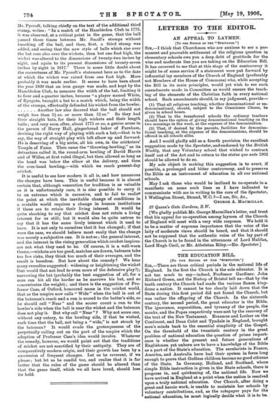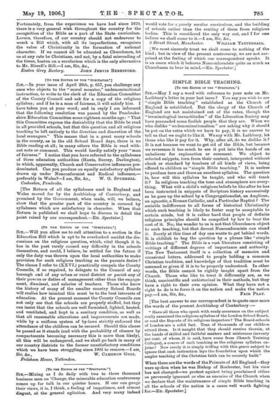THE EDUCATION BILL.
[TO THE EDITOR OF THE "SPROTATOR.1
SIR,—There are three critical periods in the national life of England. In the first the Church is the sole educator. It is not too much to say—indeed, Professor Gardiner, John Richard Green, and the Bishop of Bristol tell us—that by the tenth century the Church had made the various Saxon king- doms a nation. It cannot be too clearly laid down that the State during this first period did not found the Church, but was rather the offspring of the Church. In the sixteenth century, the second period, the great educator is the Bible. The ignorance, superstition, and tyranny of the people, the monks, and the Popes respectively were met by the recovery of the text of the New Testament. Erasmus and Luther on the Continent, and Dean Colet and Tyndale in England, brought men's minds back to the essential simplicity of the Gospel. On the threshold of the twentieth century in the great problem of national education the question of prime import. ance is whether the present and future generations of Englishmen yet unborn are to have a knowledge of the Bible as a part of the State's education. The secularists in France, America, and Australia have had their system in force long enough to prove that Godless children become no good citizens of the State. In Germany, Holland, and Scotland, where simple Bible instruction is given in the State schools, there is progress in, and quickening of, the national life. Now we have arrived in England at a point when the nation is resolved upon a truly national education. Our Church, after doing a great and heroic work, is unable to maintain her schools by voluntary contributions, and, as the ratepayer pays for the national education, he must logically decide what it is to be. Fortunately, from the experience we have had since 1870, there is a very general wish throughout the country for the recognition of the Bible as a part of the State curriculum. Lovers, therefore, of our country should not endeavour to wreck a Bill which, with all its imperfections, recognises the value of Christianity in the formation of national character. If we cannot all be educated as Churchmen, let us at any rate be Christians, and not, by a fatal misreading of the times, hasten on a secularism which is the only alternative to Mr. Birrell's Bill.—I am, Sir, &c.,











































 Previous page
Previous page